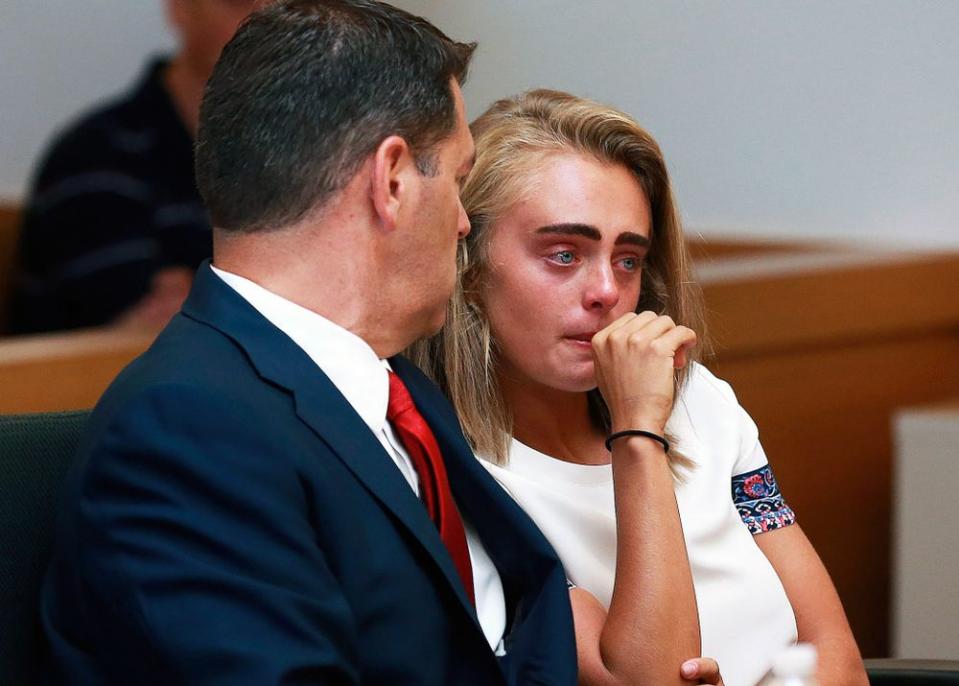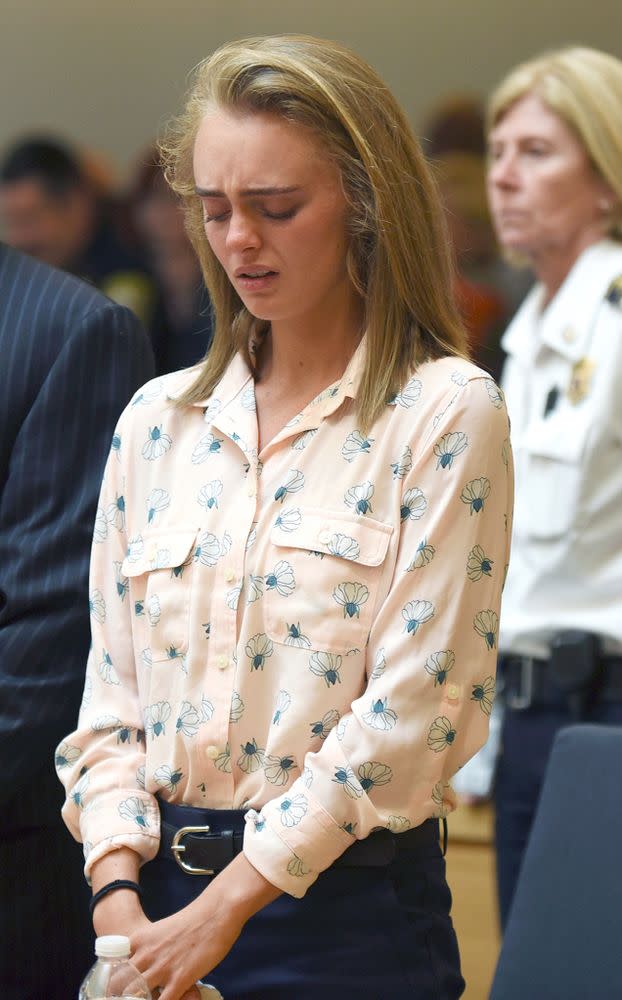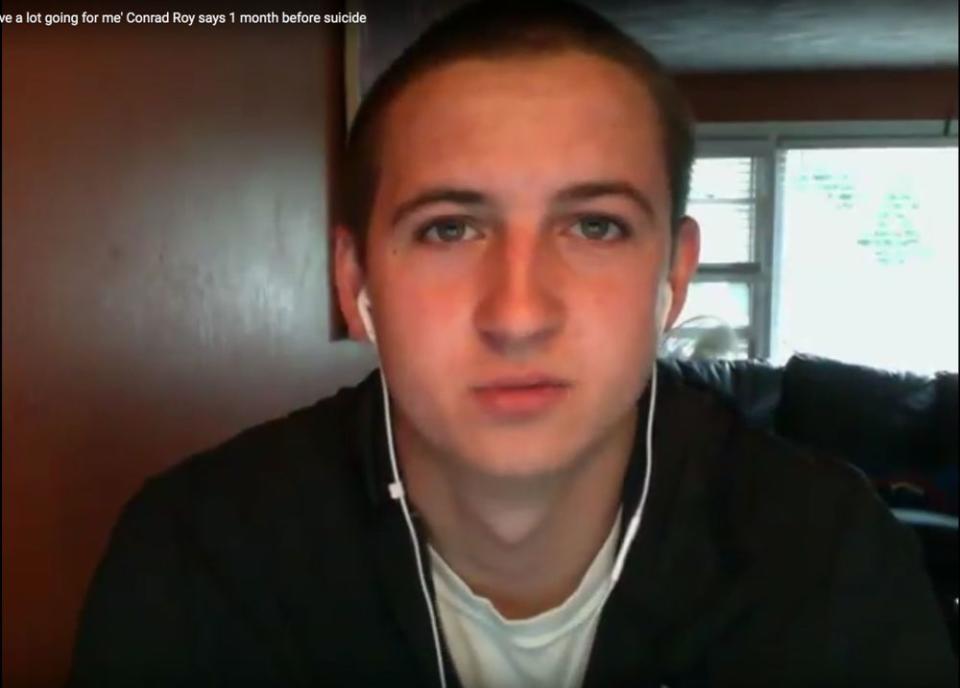Mass. Woman Sent to Jail for Sending Texts to Teen Boyfriend Urging Him to Kill Himself

Michelle Carter has begun her 15-month jail sentence one week after a court upheld her involuntary manslaughter conviction for urging her teenage boyfriend to kill himself in 2014 via texts and other statements, according to multiple media reports.
Deputies put handcuffs on the Massachusetts woman, now 22, on Monday in Taunton District Court after Bristol County Juvenile Court Judge Lawrence Moniz withdrew the suspended sentence that had allowed Carter to remain free while her 2017 conviction was appealed, reports NECN.com, WPRI and the Boston Globe.
The Massachusetts Supreme Judicial Court ruled on Feb. 4 that the conviction and sentence should stand. Carter’s attorneys say they will pursue a further review of her case by the U.S. Supreme Court, reports the Boston Herald.
Carter was 17 when, on July 13, 2014, authorities found her boyfriend, 18-year-old Conrad Roy III, dead in his pickup in a Fairhaven parking lot from carbon monoxide poisoning.


Citing hundreds of texts and statements that came to light after Roy’s suicide, prosecutors said Carter urged him to kill himself, highlighting her written admission to a friend that she told Roy to “get back in” the truck as he stepped out and shared his fears with her in a phone call in the moments before he died.
RELATED: Inside the Controversial Conviction of a Woman Who Urged Her Boyfriend to Kill Himself in Texts
Both teens struggled with depression, and Roy had made previous attempts at suicide.
Although Carter’s defense acknowledged her text exchanges with Roy, her attorneys argued that prosecutors had “cherry-picked” only those messages that served their case against her, ignoring others in which Carter urged Roy toward help for his struggles.
Her defense team further argued at trial and in her appeal that Carter’s statements were covered by First Amendment free-speech protections, and that she shouldn’t be found guilty for a crime through words alone, especially when she wasn’t on the scene where Roy died.

The case was closely watched. After Carter’s conviction, the ACLU of Massachusetts issued a statement in which its legal director, Matthew Segal, said: “There is no law in Massachusetts making it a crime to encourage someone, or even to persuade someone, to commit suicide. … If allowed to stand, Ms. Carter’s conviction could chill important and worthwhile end-of-life discussions between loved ones across the Commonwealth.”
• Want to keep up with the latest crime coverage? Click here to get breaking crime news, ongoing trial coverage and details of intriguing unsolved cases in the True Crime Newsletter.
Roy and Carter had met several years earlier while on separate vacations to Florida. Carter was the granddaughter of a Roy family friend. Although they lived about an hour apart — Roy in Fairhaven, and Carter in Plainville —– they continued to stay in touch mostly through calls, emails and texts, Roy’s family and friends said.
Still, many of those family members and friends were surprised when Carter showed up after Roy’s death, sharing condolences and claiming the two were in a relationship.

Police said Carter deliberately misled friends in the days and hours before Roy died, claiming to them that he’d gone missing at the same time the two of them were in contact.
RELATED: Mass. Woman Who Urged Boyfriend’s Suicide in Texts Argues Prosecutors ‘Cherry-Picked’ Messages
In finding Carter guilty, Judge Moniz highlighted two revelations from Carter’s trial. As Roy expressed his desire to abort his fatal plan by getting out of the truck, Carter told him to get back in. Then she initially failed to tell anyone else about it.
“She did nothing,” said Moniz. “She did not call the police or Mr. Roy’s family. Finally, she did not issue a simple additional instruction [to Roy]: ‘Get out of the truck.’”
The Massachusetts high court ruling echoed that theme when it rejected Carter’s appeal.
RELATED VIDEO: Michelle Carter Found Guilty of Involuntary Manslaughter for Urging Her Boyfriend to Kill Himself
Roy was a “vulnerable, confused, mentally ill, 18-year-old” who had stepped out of his truck as it filled with carbon monoxide,” said the court’s opinion written by Justice Scott L. Kafker. “But then in this weakened state he was badgered back into the gas-infused truck by the defendant, his girlfriend.”
“After she convinced him to get back into the carbon monoxide filled truck,” wrote Kafker, “she did absolutely nothing to help him: she did not call for help or tell him to get out of the truck as she listened to him choke and die.”
On Monday ahead of the decision to jail Carter, her attorneys sought again to have the Supreme Judicial Court intervene and put her sentence on hold. In a motion they argued, “There are substantial Constitutional issues” meriting further review by the U.S. Supreme Court, according to the Boston Herald. Jailing Carter now would mean she might serve her full sentence before the U.S. Supreme Court “issues its decision and provides further guidance,” they wrote.
The Massachusetts high court denied the emergency motion.
“We hope that no one else ever has to feel this pain,” Roy’s aunt, Becky Maki, said in expressing the family’s relief after Carter was taken into custody, according to the Associated Press. “His life mattered.”
If you or someone you know is considering suicide, please contact the National Suicide Prevention Lifeline at 1-800-273-TALK (8255), text “home” to the Crisis Text Line at 741-741 or go to suicidepreventionlifeline.org.

